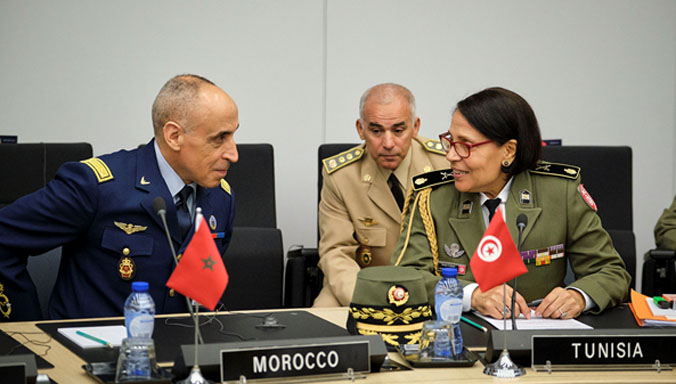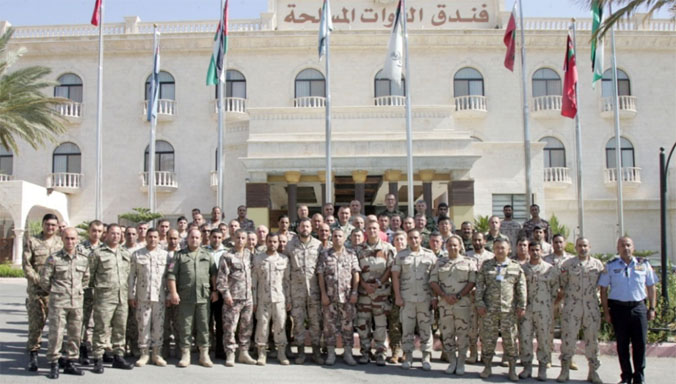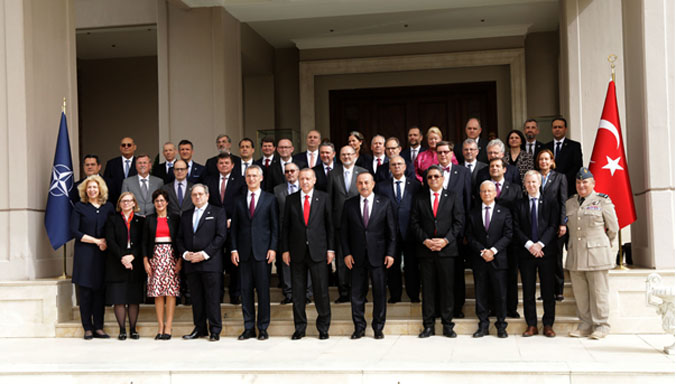Mediterranean Dialogue
The Mediterranean Dialogue (MD) is a partnership forum that aims to contribute to security and stability in the wider Mediterranean region, and promote good relations and understanding among participating countries and NATO Allies. Currently, the following non-NATO countries take part in the Dialogue: Algeria, Egypt, Israel, Jordan, Mauritania, Morocco and Tunisia.

- Launched in December 1994, the Mediterranean Dialogue's overall aim is to contribute to regional security and stability, achieve better mutual understanding and dispel any misconceptions about NATO in participating countries.
- The Euro-Atlantic area and the Mediterranean share many common security challenges; their security cannot be separated.
- In February 1995, a first group composed of Egypt, Israel, Mauritania, Morocco and Tunisia joined the Dialogue, followed by Jordan in November of that year, and Algeria in March 2000.
- The Dialogue is a flexible and unique forum, which has continuously evolved over the years to respond to changes in the region.
- What have not changed, however, are the MD's core principles: non-discrimination, self-differentiation, two-way engagement, non-imposition, diversity and complementarity to other international initiatives in the region.
- It is based on two pillars: political dialogue and practical cooperation.
A political dialogue
Security threats in the Mediterranean and North African regions are generated by conflict spill-over from fragile or failing states, instability caused by and stemming from terrorism and transnational terrorist groups, as well as all forms of illegal trafficking, cyber threats, and also chemical, biological, radiological and nuclear (CBRN) threats, and challenges in maritime security.
To build a shared understanding of common security challenges, participants can engage both bilaterally (NATO+1) and multilaterally (NATO+7) and, by doing so, create a security community on both sides of the Mediterranean Sea. Every year, bilateral and multilateral meetings take place at different levels (Heads of State and Government; Ministers of Defence and Foreign Affairs; Ambassadors; staff level). Discussions provide an opportunity to share views on a range of security issues relevant to the region and consider ways of broadening the political and practical dimensions of the Mediterranean Dialogue. NATO's Partnerships and Cooperative Security Committee has overall responsibility for the Mediterranean Dialogue. The Committee meets at the level of Political Counsellors on a regular basis to discuss all matters pertaining to the Dialogue and its development.
The Dialogue is founded on six key principles:
- Non-discrimination: all partners are offered the same basis for cooperation and discussion with NATO;
- Self-differentiation: the Dialogue allows for a tailored approach to the specific needs of each partner;
- Two-way engagement: the MD is a two-way street, wherein the Alliance seeks contributions from partners for the success of the Dialogue through a regular consultation process, and partners express their needs and goals to NATO;
- Non-imposition: partners are free to choose the pace and extent of their cooperation with NATO;
- Diversity: the MD respects and takes into account the specific regional, cultural and political contexts of the respective partners;
- Complementarity: NATO's initiative complements that of other international organisations in the region.
Practical cooperation
Every two years, NATO and each MD partner country agree on a bilateral partnership document called the Individual Partnership Cooperation Programme (IPCP). Over time, this document has become increasingly ambitious and provides a clear framework for cooperation.
Practical cooperation is a two-way street with both sides benefitting from the experience and expertise of each other. MD partners share expertise, best practices and knowledge with NATO in preventing and countering violent extremism, the protection of critical energy infrastructure, missile defence or cyber security, to name just a few areas. These exchanges are critical to enhancing the understanding of shared threats.
Military education and training forms the greater part of the practical cooperation agenda; over 30 areas of cooperation are offered to all MD partners through a Partnership Cooperation Menu (PCM). Activities can range from security sector reform and capacity-building to interoperability, resilience to CBRN threats, counter-terrorism and maritime security. This wide range of activities aims to support the capacity of participants to tackle regional threats shared by NATO Allies. Activities are selected in areas of mutual interest to both NATO and each MD partner, depending on the specificities of the country. Activities can be conducted in areas such as small arms and light weapons, cyber defence, the modernisation of the armed forces, protection of critical energy infrastructure and civil preparedness. In total, over 1,000 activities are available to NATO and MD partners.
MD partners also participate in and contribute to various NATO activities, including NATO operations and hosting military exercises. For instance, Egypt and Morocco contributed to the Implementation Force (IFOR)/ Stabilisation Force (SFOR) in Bosnia and Herzegovina; Jordan and Morocco contributed to the ongoing Kosovo Force (KFOR); and Jordan participated in the International Security Assistance Force (ISAF) in Afghanistan and Operation Unified Protector (OUP) in Libya. MD partners have participated in NATO and Allied military exercises, and Jordan hosted a regional exercise supported by NATO in 2017 called REGEX 2017. In 2020, Morocco was the second country to host this exercise (REGEX 2020).

MD partners participate in REGEX 2017, a regional exercise hosted by Jordan and supported by NATO.
Other cooperation programmes complement the Partnership Cooperation Menu: MD partners are active in the Science for Peace and Security (SPS) Programme; Jordan and Tunisia benefit from the Defence and Related Security Capacity Building Initiative, participate in the Planning and Review Process (PARP), and are part of the Building Integrity (BI) framework; Jordan, Mauritania, Morocco and Tunisia are involved in the Defence Education Enhancement Programme (DEEP); and several MD partners exercise or participate with NATO Allies in the framework of the Euro-Atlantic Disaster Response Coordination Centre (EADRCC).
In principle, activities within the Mediterranean Dialogue take place on a self-funded basis. However, Allies consider requests for financial assistance in support of partners' participation in the Dialogue, allowing funding of up to 100 per cent of participation costs in MD activities.
Evolution
Since its inception in 1994, the Mediterranean Dialogue has evolved to respond to ever-increasing changes in the security and political environment. Cooperation has progressively expanded into a multitude of areas and both sides have increased exchanges, thereby reinforcing the Dialogue.
The Mediterranean Cooperation Group (MCG) was established in July 1997, giving greater impetus to the initiative, while cooperation was increased and relations were strengthened through multiple visits and bilateral agreements. The MCG was succeeded in 2011 by the Political and Partnerships Committee, which was itself succeeded in 2014 by the Partnerships and Cooperative Security Committee.
At the Istanbul Summit in June 2004, NATO invited Mediterranean partners to establish a more ambitious and expanded framework, guided by the principle of joint ownership and taking into consideration their particular interests and needs. An annual Mediterranean Dialogue Work Programme focusing on agreed priority areas became the main instrument of cooperation.
At their Berlin meeting in April 2011, NATO Foreign Ministers endorsed the establishment of a single Partnership Cooperation Menu for all partners, dramatically expanding the number of activities accessible to MD countries.
At the NATO Summit in Brussels in June 2021, Allied Heads of State and Government agreed to strengthen NATO's twin pillars of political dialogue and practical cooperation with the Mediterranean Dialogue partners.

Family photo of the North Atlantic Council with Mediterranean Dialogue countries during the 25th anniversary of the Dialogue in 2019.
